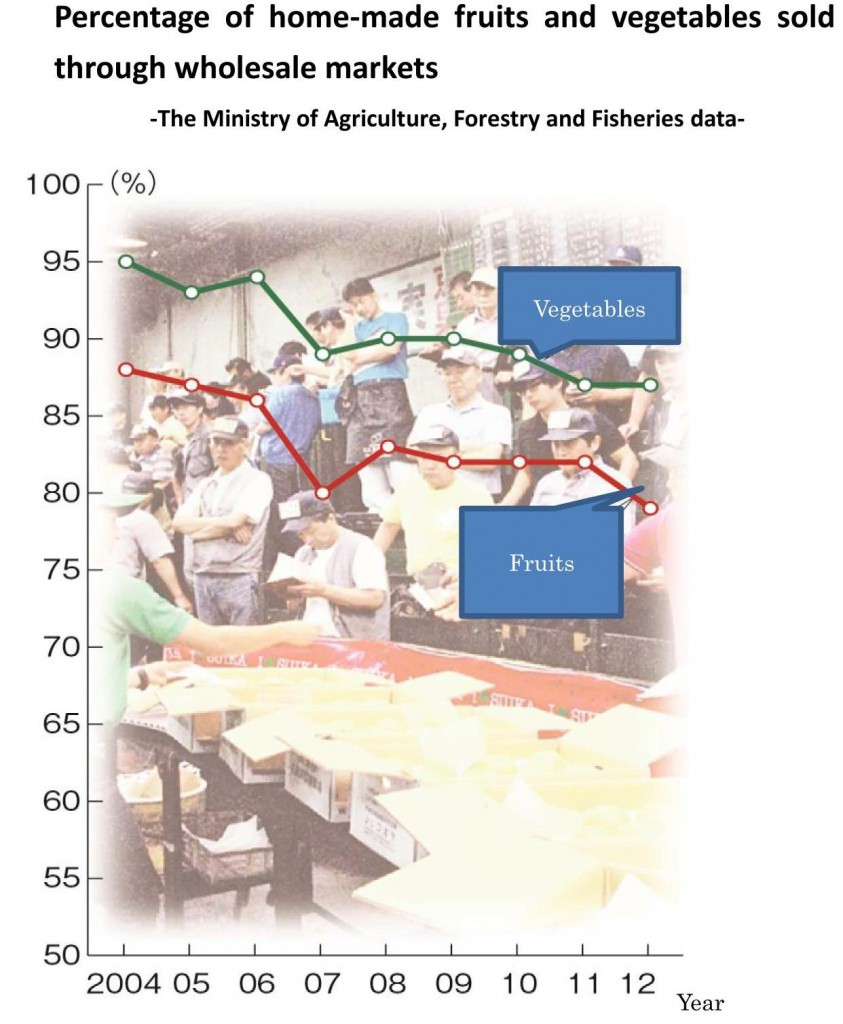Satoshi Kawahata
Sales of domestically-produced fruits and vegetables through wholesale markets have both declined about 10 percent in the last eight years, The Japan Agricultural News learned by information disclosure request made to the Ministry of Agriculture, Forestry and Fisheries.
 The sales, especially of fruits, through wholesalers are continuing to drop in recent years. Experts point out that as demand for processed products is rising, more growing regions are dealing directly with processing firms. In order to revitalize wholesale markets, it is necessary for wholesalers to respond to new demands in addition to dealing fresh produce, they say.
The sales, especially of fruits, through wholesalers are continuing to drop in recent years. Experts point out that as demand for processed products is rising, more growing regions are dealing directly with processing firms. In order to revitalize wholesale markets, it is necessary for wholesalers to respond to new demands in addition to dealing fresh produce, they say.
The ministry discloses the percentage of fruits and vegetables that are sold through wholesalers in its statistics for wholesale markets released every year. The data includes both domestically-produced and imported products, but many focus only on the trend for home-made produce, since not many imported products are traded at wholesale markets.
However, since the ministry does not indicate percentages for fruits and vegetables separately, The Japan Agricultural News asked for a breakdown of the figures. According to the figures disclosed by the ministry, 87 percent of vegetables and 79 percent of fruits produced in Japan were sold through wholesale markets in fiscal 2012, the latest available data. The percentage dropped 8 percentage points for vegetables and 9 percentage points for fruits compared with fiscal 2004, the ministry said.
According to the disclosed documents, the percentage for vegetables marked 95 percent in fiscal 2004, declined to a record low of 87 percent in fiscal 2011 and stayed the same in fiscal 2012.
Meanwhile, the percentage for fruits was 88 percent in fiscal 2004, but dropped to 80 percent in fiscal 2007. Although the figure rose a few percentage points in the following years, it declined 3 percentage points in fiscal 2012 to drop below the 80 percent mark for the first time. It was also learned the figures for fruits were constantly lower compared to the figures for greengrocery as a whole.
In explaining the reason why the percentage of fruits sold through wholesalers is declining at a higher pace, Hiroji Fujishima, Visiting Professor at Tokyo Seiei College’s Faculty of Health and Nutrition who is well-versed in product distribution in wholesale markets, says: “Processing companies which produce canned fruits and juice do not need to buy several different varieties like retailers, so there is little incentive for them to use wholesale markets.”
Along with the aging of the society, demand for processed products is likely to increase even for vegetables as well as fruits. “Wholesalers must urgently come up with measures to encourage not only fresh produce buyers but also processing firms to come to the markets,” Fujishima suggested.
(Dec. 17, 2015)

